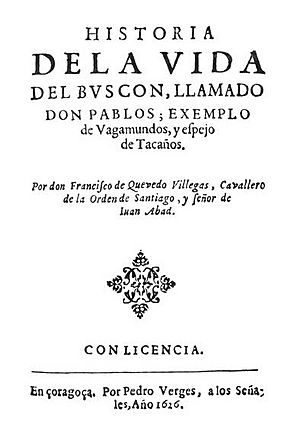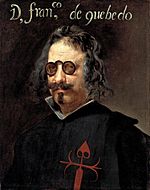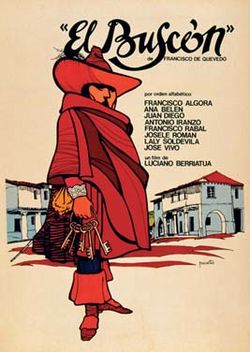El Buscón facts for kids

Original 1626 title page of El Buscón.
|
|
| Author | Francisco de Quevedo |
|---|---|
| Original title | Historia de la vida del Buscón, llamado Don Pablos, ejemplo de vagamundos y espejo de tacaños |
| Country | Spain |
| Language | Spanish |
| Genre | Picaresque, Satire |
| Publisher | Pedro Verges |
|
Publication date
|
1626 |
| Media type | Print (Hardback & Paperback) |
El Buscón (full title: Historia de la vida del Buscón, llamado Don Pablos, ejemplo de vagamundos y espejo de tacaños) is a famous picaresque novel written by Francisco de Quevedo. Its long title means "History of the life of the Swindler, called Don Pablos, a model for hobos and a mirror for misers." The book was written around 1604, but it was first officially published in 1626 in Zaragoza, Spain. Before that, people read it through handwritten copies.
Contents
What is El Buscón About?
This is the only novel that Quevedo ever wrote. It's told from the point of view of the main character, Don Pablos. He is a buscón, which means a swindler or a trickster. Pablos starts his life with two big goals: to be a good person and to become a caballero (a gentleman). But he doesn't succeed at all in either of these goals.
El Buscón is seen as a deep look at Spanish society, using humor and sharp comments. Quevedo was very good at using clever words and making fun of people in his writing. The story also suggests that if your parents don't have a good reputation, it can be very hard for you to gain one yourself.
The author, Quevedo, makes Pablos face many "linked calamities," which are like one bad thing after another. These problems make Pablos's life a bumpy ride from the very beginning.
Quevedo uses the story to make fun of Spanish society. But he also criticizes Pablos himself. Pablos tries throughout the book to move up in society and become a gentleman. In Quevedo's time, people from lower classes trying to become gentlemen was seen as something that could upset the social order. So, Quevedo shows Pablos facing many difficulties for trying to improve his life. Pablos only knows human society, and he is young and a bit naive. Eventually, he becomes a pícaro, which means a rogue or a scoundrel.
The book also includes some parts of Quevedo's own life. For example, in 1608, Quevedo had a real-life duel with another writer. This duel is made fun of in El Buscón, where a fencer who relies on math has to run away from a fight with an experienced soldier.
Why is the Language Important?
Picaresque novels are very helpful for understanding language from that time. They often record the special words and slang used by different groups of people. This includes the language of the main character and the criminals he meets. Quevedo's novel gives us a lot of information about Germanía, which was the secret language used by thieves.
Story and How It's Organized
The novel is split into three main parts, called books. Book One has seven chapters, Book Two has six, and Book Three has ten. Some experts believe that the story is not just random events. Instead, it has a clear structure and purpose. Pablos is the main character, and around him, Quevedo creates many funny and critical situations. The story has a strong connection through repeating ideas like family, dirtiness, and unfair treatment by law or criminals.
Book One: Pablos's Early Life
We first meet Pablos as a child. His father, Clemente Pablo, is a barber and also a thief. His mother, Aldonza, is believed to be a witch. People in the town also whispered that she was not a "true Christian." Pablos's brother, who was also a thief, died in prison. Pablos wants to go to school, and his parents agree. At school, he becomes friends with Don Diego Coronel. But Pablos faces many problems there.
Pablos decides not to go back to school or home. He stays with Don Diego, who also leaves school. Don Diego's father, Don Alonso, sends both boys to live with a man named Dómine Cabra in Segovia. The boys suffer from hunger because Cabra doesn't give them enough food. When another boy dies from starvation, Alonso takes both boys away. He sends them to Alcalá to study. On their way, they stop at an inn, where students make fun of Pablos and bully him.
At Alcalá, Pablos is not a gentleman, so he is separated from Don Diego. He is bullied and beaten by some university students. Later that night, four students who share his room beat him again. Pablos then starts causing trouble. He kills some pigs that aren't his and throws a party by tricking his landlady into giving him chickens. He also steals candy from a shop and swords from important people. His friends find his tricks very funny.
Pablos then gets a letter saying his father has been executed and his mother is in prison. Don Diego also gets a letter from his father, who doesn't want his son to be friends with Pablos anymore. The friends go their separate ways. Pablos decides to visit a relative to get money he inherited after his father's death.
Book Two: Pablos's Journey
On his way to Segovia to get his inheritance, Pablos meets a slightly strange man who talks about big ideas for the country. They talk about many things, including the King's recent order to send the Moriscos (people of Muslim background who converted to Christianity) out of Valencia. Many villages became empty because of this. Local rich people complained that the new workers were fewer and didn't know the farming methods well.
They stay at an inn, where Pablos meets a teacher who tries to give him a lesson. Pablos and the strange man then go their separate ways. The next day, Pablos meets an old, also strange, religious man. They eat dinner at an inn and then part ways. Pablos continues his journey, meeting a soldier with bad injuries and a hermit. They reach Cercedilla. They play cards, and the hermit tricks Pablos and the soldiers, winning all the money.
Pablos leaves the three men and meets his uncle, Alonso Ramplón, in Segovia. There is a big dinner at his uncle's house. While everyone is sleeping, Pablos goes for a walk. When he comes back, he kicks out all the party guests except his uncle. He talks with his uncle about his inheritance. Pablos then leaves his uncle and heads to Madrid. He meets a man who claims to be a gentleman from the royal court. This supposed gentleman teaches Pablos how to act at court, how to lie, and how to take advantage of situations.
Book Three: More Adventures and Troubles
Pablos and the supposed gentleman arrive at the house of Don Toribio Rodríguez Vallejo Gómez de Ampuerto y Jordán, who also claims to be a gentleman. At this house, Pablos meets many cheats and liars, a group of rogues and ruffians. Pablos still wants to become a gentleman, but he is dressed in old, torn clothes. He is then arrested and put in prison with his new friends. Pablos becomes friends with the jailer, who decides not to punish him. The jailer eventually lets Pablos go and dines with him. Pablos claims he is related to the jailer's wife. His friends, however, are punished and sent away to Seville.
Pablos changes his name to “Ramiro de Guzmán” and goes to an inn. He decides to pretend to be rich to impress the innkeeper's daughter, Berenguela de Rebolledo. Berenguela believes his lies and tells Pablos to visit her at night by climbing onto the roof and entering her room. But the roof collapses! The innkeepers wake up, get very angry, beat him, and have him thrown into jail.
He is punished in jail until two men free him. One is from Portugal, and the other from Catalonia. They also wanted to impress Berenguela. The two men try to arrange a marriage between Berenguela and Pablos. But Pablos then meets some rich, older women. Changing his name again to “Don Felipe Tristán,” Pablos goes to the villa where the two women live. One of these old women has three single nieces and wants Pablos to marry one of them. He falls for Doña Ana, the prettiest of the three.
As they have a picnic, a gentleman comes near. It's Don Diego, Pablos's old friend! Don Diego sees Pablos without being seen himself. Pablos plays cards with all the ladies and wins a lot of money. The next day, Don Diego confronts him and has his old friend beaten. Pablos is arrested by a judge and taken to an inn. Pablos stays there until he decides to try a new job: being a beggar. He meets another beggar, Valcázar, who teaches him how to do this new job.
Pablos earns some money and buys new clothes, a sword, and a hat. He goes to Toledo, where no one will recognize him. Pablos meets and joins a group of actors who perform comedies. Pablos works as a writer for them. He takes on another new name, “Alonso el Cruel.” He also writes some poems. However, the leader of this acting group is caught by the police. The group breaks up, and Pablos leaves this job.
He then falls in love with a nun. He goes to church often to see her, but the nun ignores him. He travels to Seville, where he joins a group of thieves. The thieves go out to drink and eat together. When they return home, the police stop them. One of the thieves is caught by the police. The others run away and are not caught. But Pablos and the other thieves decide to try their luck in the Americas, hoping things will get better. At the end of the novel, Pablos tells us that things went even worse for him there.
Different Versions of the Book
The father of Juan Pérez de Montalbán (1602-1638) made a copy of Buscón and sold it without permission. This caused a big argument. In 1882, Daniel Vierge published his own version of Buscón, which used new photo-reproduction techniques to make very clear pictures.
Movie Versions
A movie based on the novel was made in 1979. It was directed by Luciano Berriatúa. Francisco Algora played the role of Pablos. The movie also starred Ana Belén and Francisco Rabal.
See also
 In Spanish: La vida del Buscón para niños
In Spanish: La vida del Buscón para niños
 | George Robert Carruthers |
 | Patricia Bath |
 | Jan Ernst Matzeliger |
 | Alexander Miles |



